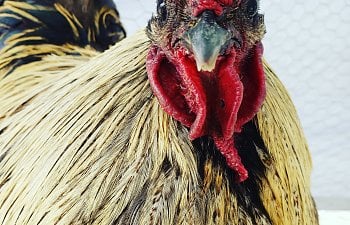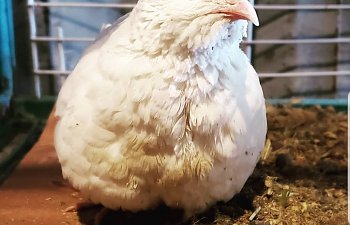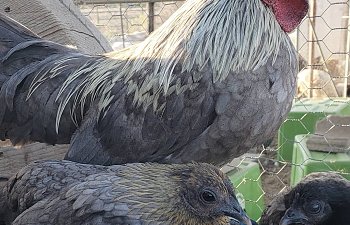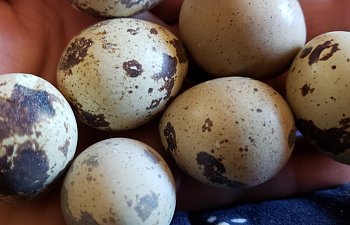There are thousands of articles, chicken gurus, livestock books, and forums that educate and lend advice. Our Backyard Chickens forum is a great source of information and provides online help available 24/7 at our fingertips. It is so incredibly easy in the internet era to become educated and teach ourselves everything we need to know to get started with poultry. We are lucky to have these resources.
We have this information available to us detailing all aspects of animal rearing, yet I rarely see information regarding when it goes awry and how to respond to the emotional process that follows. Failure can and will happen, many times over. It’s important to cope with these failures in a way that facilitates learning and forgiveness of error.
When I was first learning about chickens and my other critters, there was more than one occasion I turned to the emergency section, desperate to save one of my sick or injured birds. I have had miraculous recoveries occur based off of some advice from wonderful people. I’ve also had crippling failure resulting in the death of my bird. Sometimes it’s random chance, and sometimes it’s completely, 100% my fault.

Photo: My first Quail flock. It was a small group of 6. My goats tore apart the fencing to their enclosure. Four of them escaped and never came back home. I was heartbroken.
My fault. Yes. I have made mistakes in my journey. Raising animals isn’t for the faint of heart. Human error is a regular occurrence, even for the most careful of individuals. This is a hard fact to swallow, one that makes your chest ache. Especially when the loss of life is due to your error. Before I became more initiated in the farming world, I had a fairly severe perfectionist complex. If someone died from an impacted crop, then I should have caught it faster and treated it. If a bird was picked off by a predator, I should have had better fencing. It took me a long time to come to terms with the fact that sometimes these things happen, and sometimes even if you catch the problem and treat it, you still can’t save every bird, every time.
That doesn’t mean that one should grow callus and not give it their best, it only means they must show just as much compassion to themselves as they do to their animals. I see people who care so much about their birds, and it absolutely warms my heart, as long as these beautiful flock owners also know that they can’t possibly be omniscient over their flock’s health. I know because I’ve tried.
Heartache, failure, and death happens in any size of flock with any skill level. There are some steps that can be taken that I’ve developed over the years to help me cope in these types of situations.
Step One: Give yourself time. Chances are, whatever bird you just lost meant a great deal to you. These animals are our pets, and we know the intricacies of their quirks and personalities. It’s okay to mourn this loss. Don’t let anyone make you feel bad for mourning this animal, or lessen the importance of this moment by saying it was “Just a chicken.” Period. I was that kid that had pet chickens growing up. They all had names and individual personalities. When Mrs. Bantam, a little red Cochin, died one spring morning, I cried for hours. The situation was beyond my control at that point because she was living with some family friends, but I was completely devastated.
I remember some people very close to me wondering out loud why I was so upset over a chicken. It wasn’t meant as malicious in any way, but it still hurt. She wasn’t just a chicken, she was my favorite hen who hatched out babies each summer and who I’d share snacks with. Never let anyone make you feel like you cannot grieve the loss of your chicken, because it’s never just a chicken. Additionally, BYC is a good place to come after loss; we will grieve with you.
Photo: Captain, my one-legged rooster. He's one that I saved, and a very special rooster to boot.
Step Two: Understand that we are all learning still, even the most educated among us. What, if anything, can you learn from this situation? One fateful, awful summer during my childhood, I learned the importance of biosecurity when a disease raged through my flock and we lost the majority of them. Incidentally, that was why the remaining went to live with the family friend. But I didn’t know. I was just an excited chicken owner, bringing home some new hens. I put them with my birds, gave everyone some treats, and made sure they weren’t fighting. Everyone developed Coryza, and many of them were aging and less resistant to the disease. This forum helped me then with advice and solutions. I didn’t want to cull, so the rest of my flock went to live out their lives on a different property so we could sanitize ours and start over.
Recently, I learned from a work acquaintance that you can give a chicken too many treats and it can develop fatty liver disease. This is actually a rising problem in the poultry world, one that I am probably guilty of. Both lessons stung, and both lessons needed to be brought forward to create a safer environment for my future animals. Look for a way to bring this lesson forward from this situation.
Grow from it.
Step Three: Forgive yourself. If the loss of life it your fault, I’m so sorry. I understand that pain and guilt, and it is immense. Just know that you’re not alone. Not many people talk about it, but we’ve all been there a time or two. Our intentions aren't to be harmful by any means, but nonetheless we’ve caused the loss of a life. This is obviously different than if you are raising meat birds or deliberately culling for some reason. This refers to those situations that occur due to basic human error. This isn't meant to mean we should be flippant about our flock’s safety, but honest mistakes happen. This is a part of having a homestead.
Step Four: Fix the problem, if applicable. Sometimes it’s just a freak accident, but if it’s a fencing, flock management, housing, nutritional, or some other kind of fixable flaw, begin taking steps towards rectifying the issue. Yes, it hurts and you are grieving and maybe even feeling guilty for whatever events transpired. But to move forward productively, find the lesson of the situation. In doing that, you will contribute to the future safety of your flock.
Photo: Incubator fails. My first time incubating quail, some of them hatched two days early. They were healthy, but it was unexpected.
Death within a flock happens, but it’s not very normalized to speak openly about it. This is particularly true in cases where we are the ones at fault. I’ve had many chickens live to old age on my farm, yet I’ve had many not. Life is about balance, and having a backyard flock is no exception. As homesteaders, we never stop learning because new problems will always arise. Take a deep breath, practice some self love, and remember: we can’t save every single chicken we’ll ever own, but with practice and patience, we can save some.





